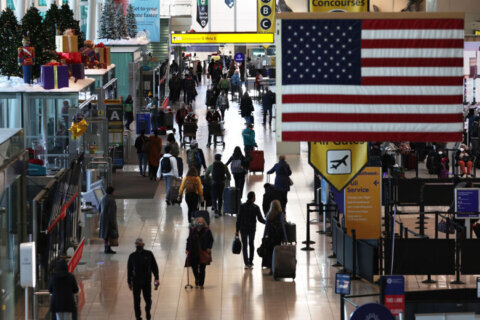This video is no longer available.
Listen to WTOP online and on the radio at 103.5 FM or 107.7 FM for our team coverage.
The collapse of Baltimore’s Key Bridge on Tuesday after a cargo ship crashed into it, suspending the flow of ships into the Port of Baltimore, may not only hurt the local economy — there could be larger supply chain issues.
“This morning’s bridge collapse in Baltimore threatens to disrupt logistics activity up and down the east coast,” Nationwide Financial markets economist Oren Klachkin said in a note Tuesday, according to CNN.
Part of that could be because of traffic tie-ups on the Interstate 95 corridor.
While many of the 30,000 to 35,000 cars and trucks that used the Key Bridge daily can be rerouted through the two nearby tunnels, that will cause traffic delays. And hazardous materials that are not allowed in the tunnels will be diverted on a longer detour.
Rerouting cargo to Philadelphia, Norfolk or the Port of New York/New Jersey could push up trucking and rail prices if the volumes are significant, and could cause some congestion at those alternative ports, Judah Levine, head of research at logistics firm Freightos, told CNN.
- Full Key Bridge collapse coverage
- Biden: Federal government should pay to rebuild Key Bridge after collapse
- Photos of the collapse
- How did container ship strike bring down Baltimore’s Key Bridge? An expert weighs in
Impact for port companies
With ship traffic to the Port of Baltimore suspended, there’s uncertainty for cargo workers.
According to the state, the Port of Baltimore generates about 15,300 direct jobs, with nearly 140,000 jobs linked to port activities.
Greg Williams, president of B & E Storage and Transfer, which handles cargo at the port, told WTOP’s Nick Iannelli that they’re in “uncharted territory.”
“Now there’s a roadblock, so to speak,” Williams said. ” Right now we’re (moving) containers in and out of the port, but any other vessels are not being able to call in, they’re shut out, obviously, due to the bridge collapse.”
He’s been on the phone with customers, working to explain where their cargo is and what the plan is moving forward.
For ships that were scheduled to come to Baltimore, they have to go somewhere else.
“Possibly Norfolk, Virginia, Philadelphia, New York, Charleston — there a predestined route on these ships, they’re making calls probably to Baltimore, Norfolk, New York, or up and down the East Coast Seaboard. So somewhere that freight will get unloaded at one of these other ports,” Williams said.
As for the workers: “Right now … we’re moving containers in and out, but once that’s done, there’s nothing else.”
American Trucking Associations spokesperson Jessica Gail called the Key Bridge and Baltimore’s port “critical components” of the nation’s infrastructure.
“Aside from the obvious tragedy, this incident will have significant and long-lasting impacts on the region,” Gail told The Associated Press.
Gail noted that 1.3 million trucks cross the bridge every year — 3,600 a day. Trucks that carry hazardous materials will now have to make 30 miles of detours around Baltimore because they are prohibited from using the city’s tunnels, she said, adding to delays and increasing fuel costs.
“Timewise, it’s going to hurt us a lot,” said Russell Brehm, the terminal manager in Baltimore for Lee Transport, which trucks hazardous materials such as petroleum products and chemicals. The loss of the bridge will double to two hours the time it takes Lee to get loads from its terminal in Baltimore’s Curtis Bay to the BJ’s gasoline station in the waterfront neighborhood of Canton, he estimated.
The century-old Domino sugar refinery, located at the port and a Baltimore institution, expects “no short-term impact” to its operations in the city. Marianne Martinez, a spokeswoman for Domino parent ASR Group, said the refinery has six to eight weeks of raw sugar supplies on hand.
Broader economic impact
Last year, the port handled a record 52.3 million tons of foreign cargo worth $80 billion, according to the state. In addition to cargo, more than 444,000 passengers cruised out of the port in 2023.
Sen. Chris Van Hollen said Tuesday morning that emergency funding from the Department of Transportation will be released quickly to help with cleanup and recovery.
“There’s no doubt that this will have a significant impact on port operations and have ripple impacts around the country,” Van Hollen said.
Baltimore’s port has become increasingly important to U.S. retailers and manufacturers seeking to diversify their supply networks and bring goods closer to customers, Jonathan Gold, vice president of supply chain and customs policy at the National Retail Federation, told The Associated Press.
“Everybody is trying to figure out the impact of the supply chain” from the loss of the bridge, said Gold who spoke with big and small retailers Tuesday. “What they had going into the port or what is currently at the port destined for somewhere else.”
Gold added that it’s too early to tell how long shipments might be delayed.
WTOP’s John Domen, Nick Iannelli, CNN and The Associated Press contributed to this report.
Get breaking news and daily headlines delivered to your email inbox by signing up here.
© 2024 WTOP. All Rights Reserved. This website is not intended for users located within the European Economic Area.








